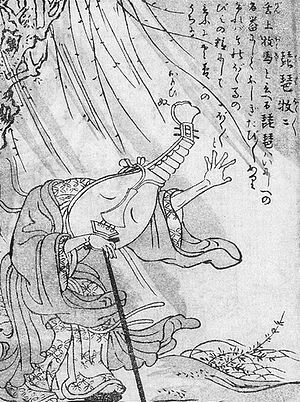
Tsukumogami (付喪神, "artifact spirit") are a type of Japanese spirit. According to the Tsukumogami-emaki, tsukumogami originate from items or artifacts that have reached their 100th birthday and thus become alive and aware. Any object of this age, from swords to toys, can become a Tsukumogami. Tsukumogami are considered spirits and supernatural beings, as opposed to enchanted items.
Tsukumogami vary radically in appearance, depending on the type of item they originated from as well as the condition that item was in. Some, originating from paper lanterns or broken sandals, can have tears which become eyes and sharp teeth, thus giving a horrifying visage. Others, such as worn prayer beads or teacups, may merely manifest faces and appendages, giving a warm and friendly appearance.
Though by and large Tsukumogami are harmless and at most tend to play occasional pranks on unsuspecting victims, they do however have the capacity for anger and will band together to take revenge on those who are wasteful or throw them away thoughtlessly. To prevent this, to this day some jinja ceremonies, such as the Hari Kuyō, are performed to console broken and unusable items.
It is said that modern items cannot become Tsukumogami; the reason for this is that tsukumogami are said to be repelled by electricity. Additionally, few modern items are used for the 100-year-span that it takes for an artifact to gain a soul.
Some of the famous Tsukumogami include the following:
- Abumi-guchi: stirrup
- Bakezōri: straw sandals
- Boroboro-ton: comforter
- Chōchinobake: lanterns
- Furu-utsubo: archer's quiver
- Ichiren-bozu: prayer-beads
- Ittan-momen: roll of cotton
- Jotai: cloth draped from folding screens
- Kameosa: sake jars
- Kasa-obake: umbrellas
- Kosode-no-te: kimono robes
- Kyōrinrin: scrolls and papers
- Morinji-no-okama: tea kettles
- Shirōneri: mosquito netting or dust cloths
- Ungaikyo: mirrors
- Yamaoroshi: grater or porcupine
- Zorigami: clocks